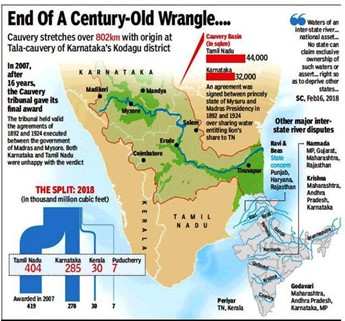Ahmedabad
(Head Office)Address : 506, 3rd EYE THREE (III), Opp. Induben Khakhrawala, Girish Cold Drink Cross Road, CG Road, Navrangpura, Ahmedabad, 380009.
Mobile : 8469231587 / 9586028957
Telephone : 079-40098991
E-mail: dics.upsc@gmail.com

Cauvery Water Dispute
News: The Cauvery water dispute has arisen again post Karnataka government declining to release waters to Tamil Nadu because of poor monsoon and shrinking water capacity in its reservoirs.
Background of Cauvery Water Dispute:
• The issue dates back 1892 between Presidency of Madras and Princely state of Mysore.
• 50-year agreement was reached between Mysore and Madras in 1924 regarding water sharing.
• As the agreement ended in 1974, Karnataka started diverting water into its four newly made reservoirs, without the consent of Tamil Nadu which resulted in dispute in post independent India.
• After several years, the Cauvery Water Disputes Tribunal (CWDT) was established in 1990 to resolve the issue.
• CWDT issued its final award in February 2007 and specified water allocations among the four states (Tamil Nadu, Karnataka, Kerala and Puducherry) in the Cauvery basin, considering the total availability of 740 TMC in a normal year.
• In 2018, the Supreme Court declared the Cauvery a national asset and largely upheld the water-sharing arrangements determined by the CWDT.
• It made minor readjustments in the CWDT order. As per the judgement, Tamil Nadu – 404.25 TMC, Karnataka- 284.75 TMC, Kerala 30 TMC and Puducherry 7 TMC.
• It also directed the Centre to notify the Cauvery Management Scheme. Central government notified the ‘Cauvery Water Management Scheme’ in June 2018, constituting the ‘Cauvery Water Management Authority’ and the ‘Cauvery Water Regulation Committee’.
What are the reasons for Cauvery water dispute?
• Geographical and Hydrological Factors - The Cauvery River starts from the catchment area in the Brahmagiri Hills at Talakaveri in Coorg district and passes through four districts of Karnataka before entering Tamil Nadu at Dharmapuri district. Both states rely heavily on the river, causing conflicting water needs for urban areas and agriculture.
• Sharing of Waters: Karnataka claims that it doesn’t receive its due share of water from the Cauvery River.
• Inefficient Water Use: Inefficient irrigation methods lead to low crop productivity per unit of water used.
• Climate Crisis: The dispute escalates when monsoon fails, as there is lesser water to share. This year, Karnataka and Tamil Nadu have received less than normal rainfall during the monsoon.
• Political Factors: Political parties capitalize on water disputes for mobilization. The complexities have been underlined by confusion over which group supports which bandh.
• Legal and Regulatory Decisions: The Supreme Court’s refusal to interfere with an order telling Karnataka to release 5,000 cusecs of water daily to Tamil Nadu for 15 days has sparked protests in the former state.
• Both Karnataka and Tamil Nadu disagree with the water sharing agreement of Cauvery Water Management Authority (CWMA).
What are Constitutional arrangements to solve Inter-state water disputes?
• Schedule 7 of the Constitution distinguishes between the use of water within a State and the purpose of regulating interstate waters.
• Article 262 - In case of disputes relating to waters, Parliament may by law provide for the adjudication of any dispute or complaint with respect to the use, distribution or control of the waters of, or in, any inter-State rivers. Parliament may, by law also provide that neither the Supreme Court nor any other court shall exercise jurisdiction in respect of any such dispute or complaint as mentioned.
What are statutory arrangements to solve such disputes?
• River Board Act 1956 - The River Boards are supposed to advise on the Inter-state basin to prepare development scheme and to prevent the emergence of conflicts.
• Inter-State Water Dispute Act 1956 - If a particular State or States approach the Union Government for the constitution of the tribunal: (a) Central Government should try to resolve the matter by consultation among the aggrieved States; (b) In case, consultation does not work, then the Union Government may constitute the tribunal.
Why does issue of Inter-state water dispute continue to persist?
• The River tribunal can only make an award and cannot make it binding.
• Lack of technical expertise in the tribunals members
• State government’s usually exploit the issue for political gains. They complain on one side while on the other side they don’t implement awards given by tribunals.
• There is a lack of data regarding water flows, seasonal variations etc. which results in ambiguities regarding availability of water, surplus water for sharing etc.

Address : 506, 3rd EYE THREE (III), Opp. Induben Khakhrawala, Girish Cold Drink Cross Road, CG Road, Navrangpura, Ahmedabad, 380009.
Mobile : 8469231587 / 9586028957
Telephone : 079-40098991
E-mail: dics.upsc@gmail.com
Address: A-306, The Landmark, Urjanagar-1, Opp. Spicy Street, Kudasan – Por Road, Kudasan, Gandhinagar – 382421
Mobile : 9723832444 / 9723932444
E-mail: dics.gnagar@gmail.com
Address: 2nd Floor, 9 Shivali Society, L&T Circle, opp. Ratri Bazar, Karelibaugh, Vadodara, 390018
Mobile : 9725692037 / 9725692054
E-mail: dics.vadodara@gmail.com
Address: 403, Raj Victoria, Opp. Pal Walkway, Near Galaxy Circle, Pal, Surat-394510
Mobile : 8401031583 / 8401031587
E-mail: dics.surat@gmail.com
Address: 303,305 K 158 Complex Above Magson, Sindhubhavan Road Ahmedabad-380059
Mobile : 9974751177 / 8469231587
E-mail: dicssbr@gmail.com
Address: 57/17, 2nd Floor, Old Rajinder Nagar Market, Bada Bazaar Marg, Delhi-60
Mobile : 9104830862 / 9104830865
E-mail: dics.newdelhi@gmail.com